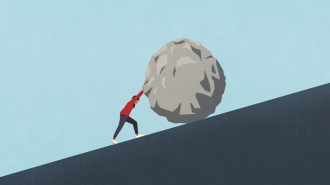Alcohol distills aggression in large men
Study supports notion that bigger men are meaner drunks
As St. Patrick’s Day approaches, it may pay to keep in mind that there is a kernel of truth to the stereotype that large men are especially prone to being DWI — dangerous while intoxicated.
When they were drunk, bigger men became especially aggressive when given the opportunity to administer electric shocks to a fictitious opponent in a laboratory contest, say psychologist Nathan DeWall of the University of Kentucky in Lexington and his colleagues. Yet larger men showed no aggression increases after downing a nonalcoholic placebo drink.
Intoxicated women showed little taste for shocking another person in the same experimental contest regardless of their weight, DeWall’s team reports in a paper published online February 25 in the Journal of Experimental Social Psychology.
Big men under the influence don’t always behave badly, DeWall emphasizes. “There will inevitably be scrawny, intoxicated brawlers and big, nice boozed-up imbibers,” he says.
But the new findings suggest that, in general, the bigger the guy, the greater the chances of alcohol-related mayhem.
His findings fit with a theory proposed by psychologist Aaron Sell of the University of California, Santa Barbara, that physically imposing individuals — usually men — can get their way in interpersonal disputes through force, making them prone to anger and to feeling entitled to special treatment.
“I would have predicted that larger men would become more aggressive even when sober,” Sell says. The laboratory task used by DeWall’s group may not have provoked sober big men enough to trigger aggressive responses, he suggests.
Researchers have already noted that large men report more previous incidents of physical aggression than anyone else, remarks psychologist John Archer of the University of Central Lancashire in Preston, England. Alcohol use might contribute to that pattern, but a general association between physical size and antagonistic tendencies is also possible, Archer says.
DeWall’s team recruited 438 men and 442 women, all of whom drank alcohol socially. Participants ranged in age from 21 to 35.
Volunteers were randomly assigned to quaff either an orange juice cocktail equivalent to two or three typical drinks, or a placebo containing just a dash of alcohol as well as a spray of alcohol on the glass rim for flavor.
Participants then competed against a fictitious, unseen opponent in a contest that involved pressing a computer key as fast as possible after seeing a cue on a computer screen. Participants were told that the winner could press a button that delivered a shock to the loser’s finger. But in reality, the researchers predetermined for each round whether a volunteer would end up on the receiving end of a shock.
Upon “losing,” participants received one-second shocks that increased from mild to intense in order to mimic the escalation of real-life violent clashes.
Previous research suggests that people who behave aggressively in daily life deliver the biggest shocks in this kind of contest. In this study, the length and intensity of shocks delivered by intoxicated men rose sharply as the body weight of those men increased from 130 to 215 pounds.
DeWall’s group has yet to examine whether men weighing more than 215 pounds, extremely tall men or men with muscular physiques also react especially harshly when buzzed on alcohol.







